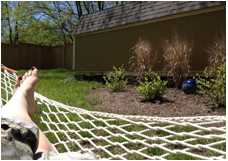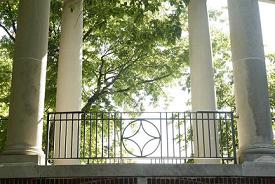 |
||||||||||
Our lunch panel featured three deans reflecting on the teaching landscape at Vanderbilt, faculty and graduate students shared their classroom experiences during concurrent sessions, and graduates of our Teaching Certificate and SoTL Scholars programs presented their scholarship of teaching and learning during an afternoon poster session.
We celebrated those graduates, along with graduates of the CFT’s new Certificate in College Teaching, during a ceremony at the end of day. In total, 49 individuals completed our graduate student and post-doc programs this year, almost triple our previous record high. Thanks to the efforts of several graduate student recorders, recaps of most of the panels and sessions from the event are now available on the CFT blog. Follow these links to get a sense of the conversations at this year’s Celebration of Teaching.
|
|
GTFs provide a variety of services for Vanderbilt’s graduate, post doc and professional students, including one-on-one consultations on teaching issues and professional development, syllabus and course design, interpreting and responding to student evaluations, writing teaching statements, and engaging techniques such as discussion leading, lecturing, and using technology in the classroom.
They also create and facilitate Teaching Assistant Orientation, Teaching Workshops, and the annual Graduate Student Teaching Event for Professional Development (GradSTEP) conference. In addition, they support the Certificate in College Teaching and various CFT initiatives.
To schedule an appointment with a GTF, please call 322-7290.
![]()
Team-based learning
 |
This spring, the Center for Teaching hosted two events where faculty members talked about their use of team-based learning (TBL) and its impact on their students’ learning. TBL is a teaching approach widely used in the health professions that can also be used effectively to teach in other disciplines. In essence, it is a structured form of small-group learning that emphasizes student preparation out of class and application of knowledge in class.
On April 4th, Eric Mazur talked about his successful experiments with TBL with a small group of interested faculty following his public talk, and on May 3rd, Tyler Reimschisel shared his successful use of TBL in undergraduate medical education at Vanderbilt (link to Celebration of Teaching).
We have prepared a teaching guide that describes the essential elements of TBL, including its theoretical basis and evidence of effectiveness. See it and our other teaching guides here.
![]()
Summer Reading Recommendations from CFT Staff
by CFT Assistant Director Nancy Chick
 |
For many of us in academia, June brings relatively empty calendars and full reading lists. I love hearing what friends and colleagues are planning on reading during the summer and what they’d suggest for others’ lists, so I again asked my Center for Teaching colleagues for their recommendations.
Last summer, I wrote about a memoir by a literature professor who looks back at her own education to see how it informs who she is in the classroom. This summer, I'm again drawn to memories, but of a different kind. In some of my collaborations this year, I've listened with fascination as colleagues have talked about when and why they became interested in their field—sometimes, a concrete memory of a single moment or person.
I have a series of moments like that, and (perhaps appropriately for my field) most of them revolve around texts. While I don't remember the first—Toni Morrison's Sula or Adrienne Rich's "Diving into the Wreck" or Walter Farley’s The Black Stallion series or Milton's Paradise Lost or E. E. Cummings's "somewhere i have never travelled, gladly beyond"—I do remember that each moment felt something like falling in love.
Carmela Ciuraru’s First Loves: Poets Introduce the Essential Poems That Captivated and Inspired Them (2000)offers such moments by 70 writers, including Sherman Alexie, Margaret Atwood, Eavan Boland, Billy Collins, Louise Glűck, Donald Hall, Yusef Komunyakaa, Maxine Kumin, Ursula K. Le Guin, Joyce Carol Oates, Robert Pinsky, and Richard Wilbur, among others. Ciuraru simply wrote to them and asked, “What poem has haunted you, provoked you, obsessed you, made you want to speak back to it?” (21) The result is 249 delicious pages of the responses, including the poems themselves and the writers’ brief reflections. One recalls a parent reading a nursery rhyme, passing on the playfulness and rhythms of language. Another remembers first discovering herself in a poem, after reading so much about white men—people who look nothing like her. Another is comforted by a specific poem’s view of death. Yet another finally feels understood by a poem that captures the ambivalent experience of loving an alcoholic parent.
Boland claims that these texts are the writer’s “epicenter” (50). They capture a primal moment of meeting the raw material that connected them to their chosen medium—words, language, poetry. I don’t think such moments are limited to professional writers, though. I hear my biology, history, neuroscience, art history, and German colleagues talk about their fields in much the same way. I can’t help but wonder what it would be like to read First Loves: Scientists Introduce the Essential Questions That Captivated and Inspired Them or Historians Introduce the Essential Moments That Captivated and Inspired Them. Find a copy of Ciuraru’s book, read a few selections, recall your first love, and tell us, “What idea, figure, theory, or text has haunted you, provoked you, obsessed you, made you want to speak back to it?” Then, consider how you’ll share your answer with your students.
CFT Assistant Director Cynthia Brame is one of those colleagues who loves her field—and I think you can tell from her recommendation:
I always use summer as time to catch up on my reading and to give me new ideas or new energy for the upcoming year. In that light, I recommend the National Academies’ Discipline-Based Education Research: Understanding and Improving Learning in Undergraduate Science and Engineering. (Yes, I know, I’m a nerd.) This compendium summarizes research on improving students’ conceptual understanding in science and engineering as well as the data on various strategies to do so, clearly characterizing the strength of those findings. The report also identifies emerging research areas, such as understanding how to assess and promote the transfer of knowledge and skills. Probably not a book for the beach, but definitely food for thought.
CFT Graduate Teaching Fellow Adam Wilsman describes his discovery of what may become an “epicenter” for him as well, reminding us that books on what Lee Shulman calls “pedagogical content knowledge” (1987, p. 8) can be equally inspiring to us:
This summer, I am reading a number of books on pedagogy in preparation for my new history teaching job, which will begin in the late summer. This past year, I didn’t teach any history courses, but by this time in August, I will be teaching four, and on subjects outside of my discipline. Thus, it’s important that I read some great works that might help me to get into the right mindset. For that, Sam Wineburg’s 2001 work, Historical Thinking and Other Unnatural Acts: Charting the Future of Teaching the Past, has been wonderful.
Wineburg’s work, while over ten years old, remains a must-read for all history educators, from college teachers to elementary school teachers and everyone in-between. In his work, Wineburg grapples with the big issues in history education that transcend frequent debates about what historians ought to teach. To Wineburg, the important question to answer is why we teach history. And what knowledge and skills do historians possess that ought to be shared and promoted in our classrooms? Throughout Historical Thinking and Other Unnatural Acts, Wineburg shares a rich array of fresh and actionable answers to these questions. What results is an excellent and trusted source for any history teacher—and better yet, it’s a book that I wouldn’t be ashamed to bring to the beach.
References
- Ciuraru, Carmela. (2000). First Loves: Poets Introduce the Essential Poems That Captivated and Inspired Them. New York: Scribner.
- Singer, Susan R., Nielson, Natalie R., and Schweingruber, Heidi A., Eds. (2012). Discipline-Based Education Research: Understanding and Improving Learning in Undergraduate Science and Engineering. Washington, D.C.: National Academies Press.
- Shulman, Lee S. (1987). “Knowledge and Teaching: Foundations of the New Reform.” Harvard Educational Review. 57(1). 1-21.
- Wineburg, Sam. (2001). Historical Thinking and Other Unnatural Acts: Charting the Future of Teaching the Past. Philadelphia: Temple UP.
![]()
Reflecting On and Documenting Your Teaching Experiences
 |
Reflecting on Teaching:
What? For Whom? Why?
Often, the motivation to improve one’s teaching by revising practices or experimenting with new initiatives stems from reflection. This reflection often focuses on feedback received from others, such as student evaluations or peer reviews. Reflection further involves one’s own assessment of experiences, through self-observation and activities that foster self-analysis such as teaching workshops or individual consultations, and/or pedagogical research.
Written reflections on teaching can be used for personal, professional, or pedagogical purposes. While teaching statements are increasingly an important part of hiring and tenure processes, they also are effective in helping one clearly and coherently conceptualize his or her approaches to and experiences of teaching and learning, and deepen and renew their commitment to values and goals for their teaching.
At Vanderbilt, promotion and review processes require faculty to reflect on their work and document their progress in teaching, research and service. When reporting on teaching, faculty are encouraged to articulate their teaching philosophy and objectives; describe past and planned course and curriculum development; and explain pedagogical initiatives, innovations or experiments and their results.
The Center for Teaching provides one-on-one consultations on evaluating and documenting your teaching. As we assist you in preparing your teaching documentation, we work with you to reflect deliberately on your practice as a means of deepening your understanding of pedagogical goals and methods, and linking those goals and methods to student learning.
If you’d like more information about reflecting on and documenting your teaching, please stop by, or call, the Center for Teaching (322-7290) or visit our set of teaching guides on the topic.
Back to top
![]()
Make the Most of Your Course Preparation Time This Summer
 |
Summer time is here, and many faculty members have a break from their usual schedules, a chance to slow down a bit and start planning their fall courses.
If you’ve got a breather, you may find this an opportune time to review and refresh your teaching plans and practices. The Center for Teaching is open all summer, with consultants ready to help you review your classroom accomplishments this past year and consider how to recreate your course designs.
We tailor our consultations to your specific needs, based on a “backward design” process described in Understanding by Design by Grant Wiggins and Jay McTighe. This useful framework works “backwards” by starting with what we usually consider the last phase of course development, the desired results. Identifying the outcomes you want from the course—the learning goals you set for your students—lays a solid foundation for an effective learning experience. Then you proceed to creating targeted assessments that provide evidence that they’re making progress toward those specific goals.
You end by designing assignments and activities that give your students practice in using their learning to initiate that progress. In sum, you:
- Identify desired results (learning goals).
- Determine acceptable evidence (assessments).
- Plan learning experiences and instruction (assignments and activities).
Come in today and we’ll help you fine-tune your current designs or create brand-new courses. Call 322-7290 to schedule an appointment.
Get a faculty member's perspective on the process by reading this Mark Sample article from The Chronicle of Higher Education.



